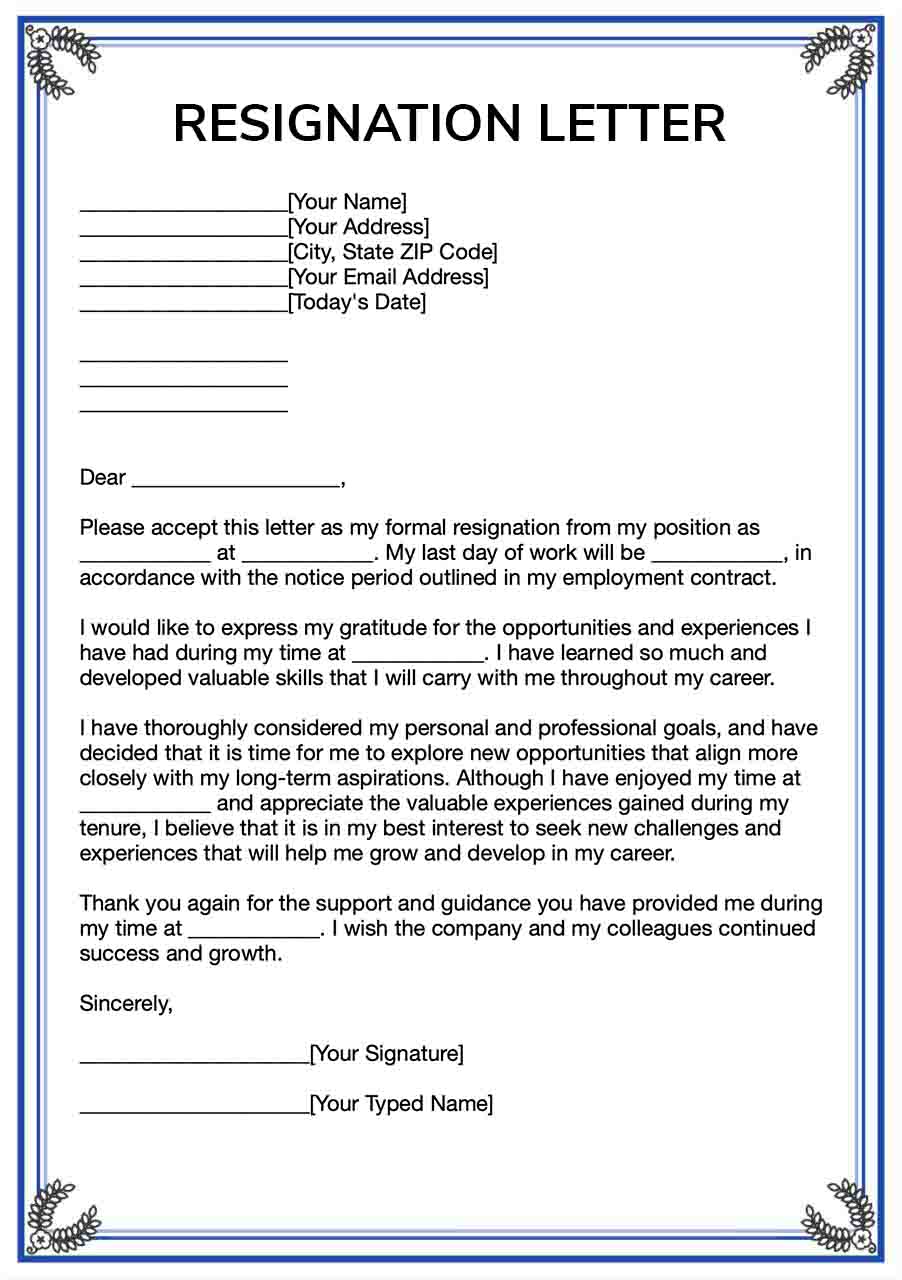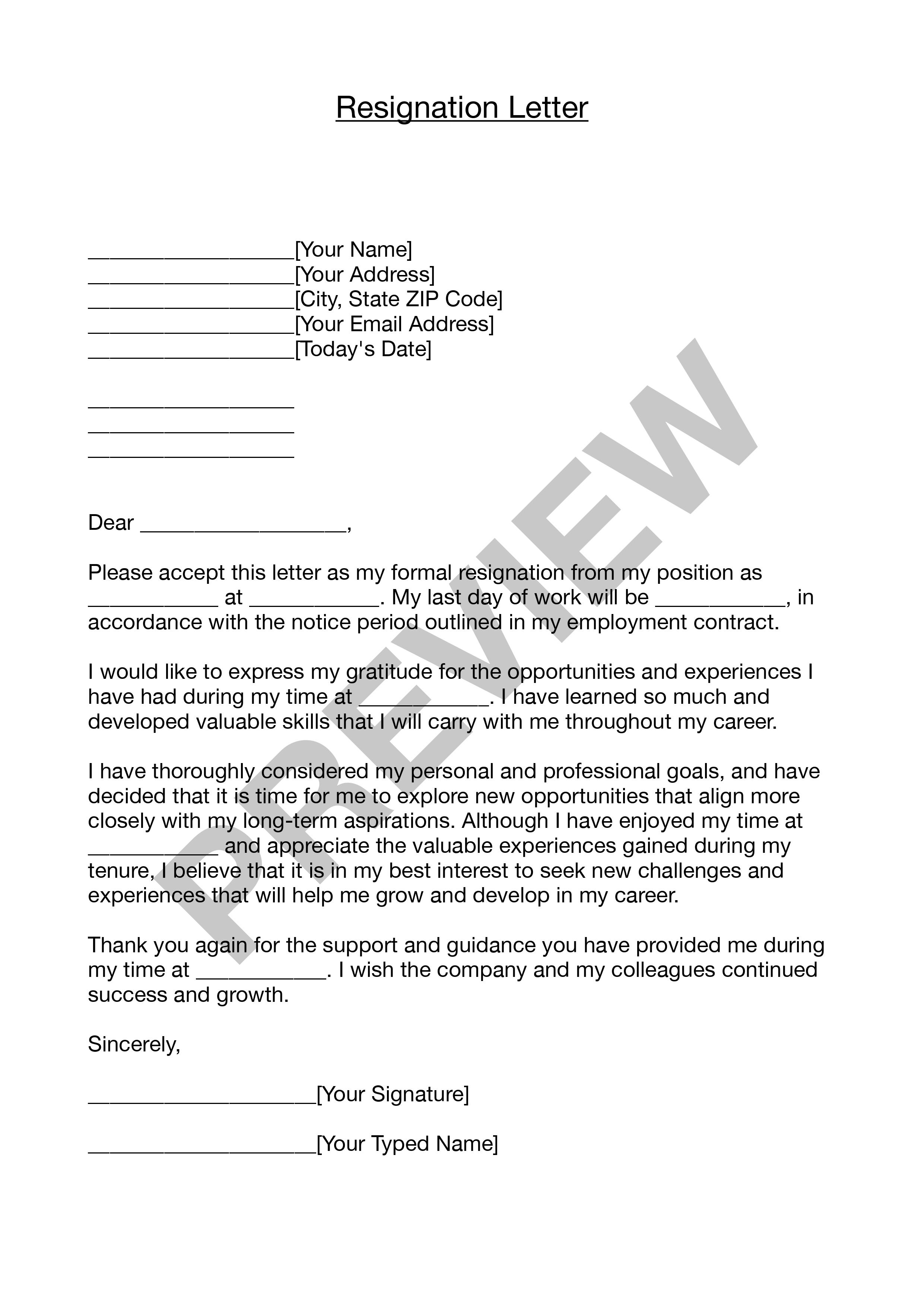Resignation Letter
Reason
Select the reason why you are leaving your job.Resignee Information
The "Resignee" refers to the person who is resigning from the job.Company Details
The "principal" refers to the person who is appointing an agent to act on their behalf.Notice
Select date in which you are going to stop working.Resignation Letter Submission
Select date in which you are going to deliver / submit your Resignation Letter.Last Updated February 2023
Alternative names:
Letter of Resignation Notice of Resignation Resignation Notice Job Resignation LetterWhat is a Resignation Letter?
A resignation letter is a formal document that an employee submits to their employer to announce their intention to leave the company. It typically includes the employee's name, job title, and the date of their intended last day of work. In the letter, the employee may provide reasons for their resignation, although this is not always necessary or appropriate.
The resignation letter is an important part of the process of leaving a job, as it serves as a written record of the employee's decision to leave. It also provides the employer with notice of the employee's departure, which allows the company to plan for a replacement and ensure a smooth transition.
In general, it is considered good practice to provide a resignation letter to your employer, even if it is not required by your employment contract. The letter should be written in a professional tone and should express gratitude for the opportunity to work at the company.
Who do you send your resignation letter to?
Generally, you should send your resignation letter to your immediate supervisor or manager. However, it's a good idea to check your company's policies or employee handbook to see if there are any specific instructions for resigning.
In addition to your supervisor or manager, you may also want to consider copying HR or other relevant parties, such as the CEO or other managers you've worked closely with. This can help ensure that everyone who needs to be informed of your resignation is aware of it, and can help facilitate a smooth transition process.
If you're unsure who to send your resignation letter to, you can always ask your supervisor or HR representative for guidance.
Who needs a Resignation Letter?
Any employee who intends to resign from their job should submit a resignation letter to their employer. It is considered a professional and courteous way to inform your employer of your intention to leave the company and to begin the process of transitioning your responsibilities to someone else.
Submitting a resignation letter is especially important if your employment contract or company policy requires you to give notice before leaving your job. In this case, the resignation letter serves as official notice that you are leaving and gives your employer the opportunity to plan for your departure and find a replacement if necessary.
Even if there is no requirement to submit a resignation letter, it is still a good idea to do so as a matter of professional courtesy. It shows that you are respectful of your employer and your colleagues and that you are committed to ensuring a smooth transition for everyone involved.
What should I include in my Resignation Letter?
Here are some things you should include in your resignation letter:
-
Date: The date on which the letter is written.
-
Addressee: The name and title of the person you are addressing the letter to.
-
Statement of resignation: A clear and concise statement that you are resigning from your position. It is recommended to use a professional and positive tone.
-
Intended last day of work: The date you intend to work until. The standard notice period is usually two weeks, but this can vary depending on your company's policies or your employment contract.
-
Reason for resignation: You may include a brief explanation of why you are resigning. However, it is not mandatory to do so and you should only include it if you feel comfortable doing so.
-
Appreciation: A statement expressing your appreciation for the opportunities and experiences gained during your time at the company.
-
Offer of assistance: A statement offering to assist with the transition process and to ensure a smooth handover of your duties.
-
Contact information: Your contact information, such as your email address and phone number, so that your employer can contact you if needed.
Remember to keep your resignation letter brief and professional. It is an official document that will go on your employment record, so it's important to make a good impression.
Frequently Asked Questions
It's generally recommended to deliver your resignation letter in person, especially if you have a good working relationship with your supervisor or manager. This shows respect and professionalism, and allows you to have a face-to-face conversation about your resignation.
When delivering your resignation letter, it's important to be prepared to answer any questions your supervisor or manager may have, and to be clear about your reasons for resigning. You should also offer to assist with the transition process and ensure that all of your job responsibilities are properly handed over to your replacement.
After delivering your resignation letter in person, it's also recommended to follow up with an email or formal letter to document your resignation and provide a written record for your own records and the company's.
It's generally recommended to give at least two weeks' notice before resigning, but this can vary depending on your company's policies and your job responsibilities.
Check your employment contract or company policies to see if there are any specific notice requirements you need to follow. If you're in a senior or highly specialized role, it may be appropriate to give more notice to allow for a smoother transition period.
Giving sufficient notice allows your employer to make arrangements for your departure, such as finding a replacement or redistributing your job responsibilities. It also shows professionalism and respect for your employer and colleagues.
If you're unable to give the recommended notice period, you should communicate with your employer as soon as possible to discuss your options and work together on a solution.
Providing reasons for resigning in your letter is optional, and ultimately up to your personal preference. You can choose to include a brief explanation if you feel comfortable doing so, but it's not necessary.
If you do decide to include reasons for resigning, it's important to be honest and professional in your explanation. You don't need to provide a detailed account of your reasons, but it's helpful to give a brief explanation that can help your employer understand your decision.
Keep in mind that your resignation letter may become a part of your employment record, so it's important to be thoughtful and considerate in what you choose to include. If you have concerns or issues with your employer or job, it may be more appropriate to discuss them in person or in a separate document, rather than in your resignation letter.
When telling your co-workers and colleagues about your resignation, it's important to maintain a professional and respectful attitude. Here are some tips for handling this situation:
-
Notify your supervisor or manager first: Before telling your co-workers and colleagues, make sure to notify your supervisor or manager first. This shows respect and allows them to prepare for your departure.
-
Schedule a meeting: Consider scheduling a meeting with your co-workers and colleagues to inform them of your resignation. This can give you the opportunity to explain your reasons for leaving, thank them for their support, and offer assistance during the transition period.
-
Be positive and professional: When sharing the news, remain positive and professional. Avoid discussing any negative aspects of the job or the company, and focus on the positive experiences you had during your time there.
-
Offer to help: Offer to help your co-workers and colleagues with the transition process by training your replacement or providing guidance on your job responsibilities.
-
Stay in touch: Keep in touch with your co-workers and colleagues after you leave, especially if you've developed strong relationships with them. This can help you maintain a professional network and potentially lead to future career opportunities.
Resigning from a job can have both positive and negative consequences. Here are some potential consequences to consider:
Positive consequences:
-
You may have more time to pursue other interests or opportunities.
-
You can take a break to recharge and refocus your career goals.
-
You may find a job that better fits your skills and interests
Negative consequences:
-
You may face financial instability if you don't have another source of income lined up.
-
You may lose some benefits, such as healthcare coverage or retirement contributions.
-
You may burn bridges with your employer or colleagues if you don't handle the resignation process professionally.
-
You may have difficulty finding future job opportunities if you have a pattern of short job tenure or a history of job hopping.
It's important to carefully consider your decision to resign and to weigh the potential consequences before taking action. Make sure to have a solid plan in place for your career goals and financial stability before resigning.


